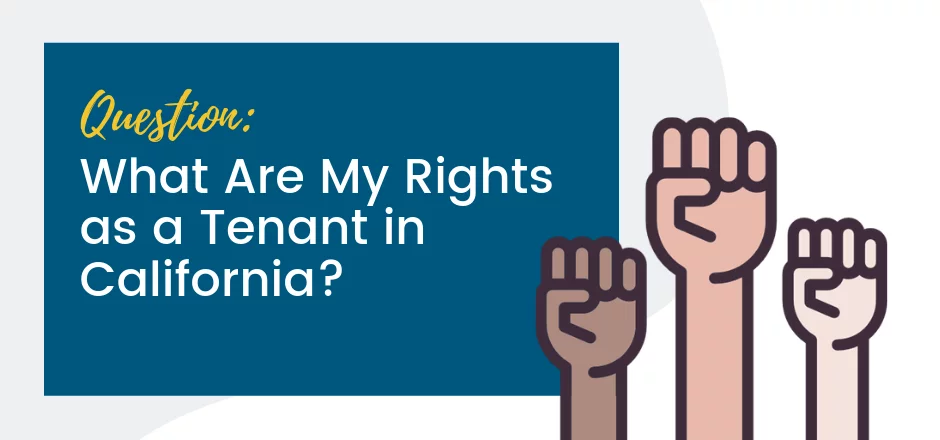What Are My Rights as a Tenant in California?
What are my rights as a tenant in California? If you rent an apartment or house in the state of California, you’ve likely asked yourself this question. In this article, we’re taking a closer look at tenants rights so you can navigate any landlord-tenant disputes with confidence.
What Are My Rights as a Tenant in California?
The state of California provides tenants rights in an effort to protect tenants from unfair landlord practices. Landlords must abide by California laws at all times.
These laws cover a wide range of topics, including everything from the application process to the return of your security deposit. It’s your responsibility to be familiar with these laws, hold your landlord accountable, and report violations to the authorities if necessary.
So, let’s get back to the question…
What are my rights as a tenant in California?
1. Tenant Application Fees
California landlords do have the right to charge you an application fee, but there are restrictions. The fee cannot be more than $35, and landlords may only charge it to recoup costs associated with the screening process (e.g., background check). If the landlord doesn’t incur charges, he cannot charge you the $35.
2. Security Deposits Limits
Security deposit regulations are set by the state. Deposits may not exceed a total of two months rent for unfurnished apartments and houses. If the property is furnished, the deposit expands up to three months of rent. If you happen to have a waterbed, the landlord also gains the right to add on an additional 1.5 months worth of rent. For example, someone in a furnished house with a waterbed who is paying $1000 for rent could be asked to pay a security deposit of $4500.
3. Pet Deposits
There are no specific guidelines for pet deposits in the state of California. This does mean landlords can set any deposit limit they want before accepting you. They cannot, however, suddenly raise the deposit without good reason later on.
4. California Security Deposit Returns
After you end a tenancy, landlords have no more than 21 days to return your deposit to you. This is, of course, assuming they don’t intend to try and keep your deposit for damages. Depending on where you live, the landlord may also be required to pay you any interest accumulated on your deposit over time.
5. Withholding Security Deposits
Landlords do have the right to withhold security deposits for damage. However, they must be able to prove the damages upon request. Generally, this starts with an inspection to create an itemized list of damages and costs. If the total value of the repairs is less than the total value of your damage deposit, they must return the difference to you within the same 21-day time period.
It is also worth mentioning that landlords cannot keep your deposit for everyday wear and tear – only for negligent damage. For example, a landlord could not keep a portion of your damage deposit for simple wear and tear from foot traffic on the carpet. They could, however, keep your damage deposit if you drop a cigarette on it, causing a large burn spot to form.
7. Smoke Alarms
Landlords must provide smoke alarms in every rental property – and more specifically, every sleeping area within the property. They must also be tested and maintained on a regular basis. Landlords aren’t specifically required to install other protective devices, such as carbon monoxide detectors.
8. Rekeying and Key Replacement
Rekeying is the process of changing locks for a new tenant upon an old tenant moving out. There is no guideline that states the landlord has to change the locks unless the new tenant is a victim of domestic violence. Landlords are also not prevented from charging a fee for key or lock replacement.
9. Withholding Rent and Deductions
California state law does give you the right to deduct money from your rent if you make necessary repairs to a rented property out of your own pocket. You can deduct up to, but no more than, one full month of rent.
However, there are restrictions:
- The repair issue must be a health or safety risk (pest infestation, black mold, etc.).
- Damages cannot have been caused by a tenant, a guest, or a pet.
- You must provide the landlord with written notice of the deduction.
- You must give the landlord a reasonable amount of time to handle the issue themselves before you self-repair and deduct.
- You may not deduct from your rent more than once every calendar year.
Note that you also have the right to withhold your rent or deduct money from it if the landlord fails in their duty to provide included utilities or services. For example, if your lease states that the landlord must provide water and heat, and he or she turns the service off without notice, you may be able to deduct a portion of your rent.
Related: How to Report a Landlord to the Health Department
10. Emergency Entry
California landlords have the right to enter your apartment or property during an emergency.
Emergencies may include gas leaks, water leaks or flooding, fires, and natural disasters that may pose an immediate danger to the tenant. For example, if a neighbor reports a water leak or gas leak, the landlord can enter your rental unit to investigate and resolve the problem.
In any other situation, landlords must give you 24 hours notice before they can enter your unit. Even then, landlords cannot enter the property without permission.
11. Maximum Rent
There is no specific maximum rent rate allotted under California state law. Landlords are free to charge you whatever they believe is fair for the property in question. Landlords may raise rent over time, but you must be provided with written notice in advance of the increase. Furthermore, you must receive at least 60 days notice if the increase is equal to or greater than 10 percent of your current rent.
12. Late Fees
Landlords do have the right to charge late fees, meaning you may face these surcharges if you fail to pay your rent on time. However, they must be reasonable, and the landlord must be able to prove your rent was late. The exact definition of “reasonable” varies based on local control laws.
13. Lease Terminations
Landlords must notify you of their intention to terminate your lease at least 60 days prior to the date of termination. If you are being evicted due to non-payment, the timeframe decreases to just three regular days (not business days).
If the landlord wishes to evict you for breaking your lease (e.g., bringing a pet into a pet-free space), he or she must give you three days to correct the problem before they officially evict you. Evictions for lease violations must follow the standard protocol for the state of California.
Related: The Guide to Evictions in Los Angeles for Landlords and Tenants
14. Subletting and Roommates
Tenants have the right to sublet units under California landlord-tenant law. However, the original tenant is fully responsible for anything that happens within the unit during the sublet lease. This includes the responsibility to pay the rent if a subletter neglects to pay and coverage for any damages to the unit during the sublet.
You also have the right to have a roommate. The roommate must be approved by the landlord before moving in. Both roommates are equally responsible for the rent and any damages, meaning that if one person fails to pay, the other must pay the sum.
Related: When Does a Guest Become a Tenant in California?
15. Landlord Disclosure Rights
California’s landlord disclosure regulations give tenants the right to know certain information about a unit or property before they move in. The goal is to ensure that tenants don’t move into a property without fully understanding certain risks, such as the future of the property or potential health and safety hazards
Examples:
- Future remodeling projects, including demolition, condo conversion, or any other significant change to the building.
- The presence of harmful substances, including asbestos, lead paint, and other carcinogenic materials.
- Potential dangers nearby, including local military bases or explosives stored within a certain distance of the property.
- Past crimes or extreme harm, including deadly accidents, deaths, or murders within the unit.
- Issues with pests, including fleas, rats, cockroaches, or bedbugs. Must include a list of recent treatment dates.
- Methamphetamine exposure, either now or in the past. E.g., if the unit was seized by police in the past due to the presence of a meth lab.
- Shared facilities, (if applicable), such as a shared bathroom, kitchen, or living room. This must be made clear before you move in.
Exercising Your Rights
Now that you know more about your rights as a tenant in California, you can now hold your landlord accountable, exercise your rights, and file a lawsuit if necessary.
If you’re interested in pursuing legal action, you need to know where to find a tenant lawyer.
That’s where we can help.
Tell us a little about the situation and one of our Attorney Referral Consultants will help connect you with an experienced tenant lawyer in Los Angeles. To get started, give us a call at (818) 340-4529.
Are you in search for a certified attorney to represent you?
Let us help you find one today!



